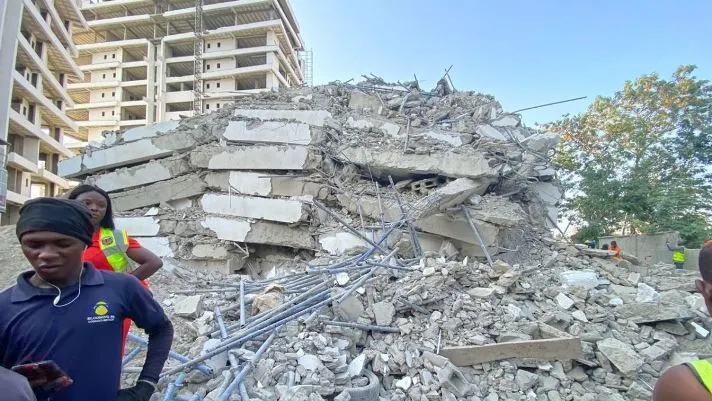By DAYO ADESULU
The recent collapse of a two-storey building under construction at the Egbelu Mgbaraja axis in Ogbogoro Community, Obio/Akpor Local Government Area of Rivers State is a stark reminder of the precarious nature of construction practices in many parts of Nigeria. This tragic incident, which left a middle-aged man named Udeme feared dead, has once again brought to the forefront the critical issues of building safety, regulatory compliance, and the devastating consequences of negligence in the construction industry. The collapse occurred on November 4, 2024, just a week after a separate incident involving a three-storey building at the Iriebe axis, which thankfully resulted in no fatalities. However, the repetition of such tragedies raises urgent questions about the safety protocols adhered to by property developers in the region.
The eyewitness account provided by Mr. Jonathan Obey paints a disturbing picture of the conditions that led to this catastrophe. He indicated that significant and deliberate infractions were committed by the property developer, specifically citing the use of substandard materials and inadequate construction practices. At the time of the collapse, contractors were reportedly working on the second floor of the building—an endeavor that should have been secure given proper adherence to safety guidelines and construction standards. However, the failure to meet basic construction requirements, including a foundation that was only three feet deep for a structure of this size, underscores a gross neglect of duty by those responsible for the project.
This incident does not exist in isolation; it reflects a broader systemic failure within the construction industry in Nigeria. Building collapses are not uncommon, and they often result from the habitual disregard for regulations that are designed to ensure safety. The case in Ogbogoro is emblematic of a troubling trend in which developers prioritize profit over safety, often cutting corners in ways that desensitize them to the potentially lethal ramifications of their actions.
The Rivers State Government’s response, which included sealing the premises of the collapsed building and declaring the property developer, Vincent Nwoye, wanted, signifies a necessary acknowledgment of the seriousness of this tragedy. By holding developers accountable for the outcomes of their negligence, the government sends a clear message that such infractions will not be tolerated. The Commissioner for Physical Planning and Urban Development, Rt. Hon. Evans Bipi, rightly condemned the gross negligence displayed by the developer, accentuating the need for compliance with existing building laws and regulations. In emphasizing the failure to obtain a government-approved building plan or to use suitable materials, the commissioner highlights critical lapses that not only imperil the lives of those involved in construction but also jeopardize the broader community.
The ramifications of such tragedies extend beyond the immediate loss of life and injury. They reverberate through the affected communities, instilling fear and distrust in the integrity of future constructions. Families who may have planned to live or work in these buildings find their lives upended by the reckless behavior of a few. Additionally, there are economic implications; investors and residents might become hesitant to engage in new construction or property development when such incidents highlight the dangers involved.
It is essential for the state and local governments to undertake urgent reforms to the regulatory framework governing construction. This includes stricter enforcement of building codes, regular inspections throughout the construction process, and immediate penalties for non-compliance. Moreover, public awareness campaigns are needed to educate property developers and the general populace about the importance of adhering to safety standards. Community-level engagement can empower residents to hold developers accountable, fostering a culture that prioritizes safety and quality over hastened profits.
The tragedy in Ogbogoro calls for a reassessment of priorities within the construction sector in Rivers State and Nigeria at large. As we mourn the loss of Udeme and hope for the recovery of the injured, it is imperative to reflect on the overarching challenges that lead to such incidents. Building safety must be a paramount concern, not an afterthought, and it is the responsibility of all stakeholders—government, developers, and communities alike—to work together towards a future where such tragedies become a relic of the past rather than a repetitive cycle of loss. Only through stringent adherence to safety protocols and a commitment to responsible construction practices can we hope to prevent further tragedies and protect the lives of individuals whose utmost aspiration is simply to find shelter and security.


